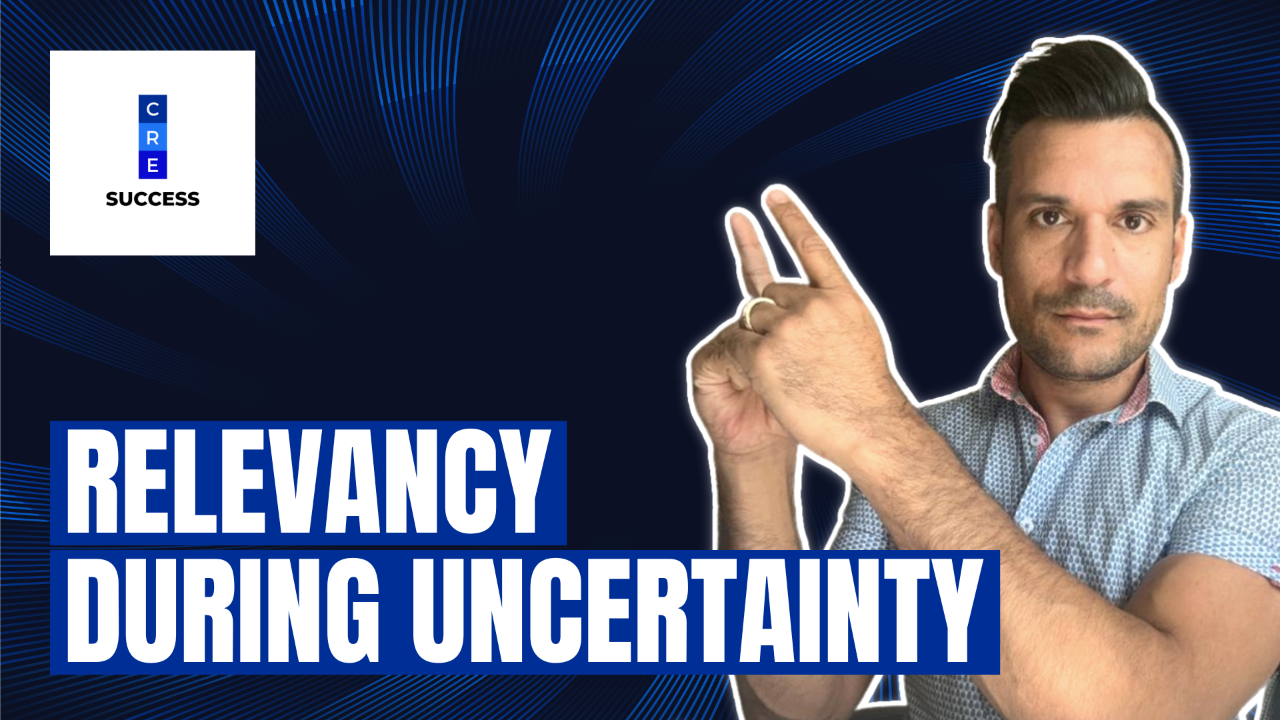Staying Relevant and Adding Value in Uncertain Markets
Apr 05, 2023
As a commercial real estate professional, it’s vital it is to maintain strong relationships with our clients and stay relevant in their eyes.
But when uncertainty grows, like many of us are experiencing in 2023, it can be challenging to keep those connections thriving when transaction volumes are down.
So, how can we continue to add value to our existing clients, engage in meaningful conversations, and keep our relationships robust?
In this week’s blog, I'll share some strategies I've found effective in navigating this challenge and ensuring that I remain top of mind for my clients and prospects.
Leverage Market Insights and Data
Regardless of market conditions, you should always strive to be a go-to expert in your area of specialisation.
To do this, make use of market insights and data to provide valuable information to your clients; share updates on transaction activity, regulatory changes, or industry trends that may impact their real estate holdings.
By providing them with actionable insights, you'll position yourself as a resource they want to deal with and that they can trust.
Elicit Feedback
Another effective way to strengthen relationships and demonstrate your commitment to excellent service is by seeking feedback from your clients.
Conduct regular surveys to gather their opinions on the services you provide, the communication channels you use, and any improvements they'd like to see.
This process not only helps you identify areas for growth but also shows your clients that their opinions matter to you.
Offer Additional Services and Support
To add value to your clients' experience, explore opportunities to offer additional services or support.
This could include conducting rent reviews, offering property appraisals, or connecting clients with complementary service providers.
By extending your reach beyond transactions, you show clients that you're invested in their long-term success.
Prioritise Relationship Development
One of the most crucial aspects of maintaining strong relationships with clients is regular communication, so make a point of check in with them, even when there's no immediate transaction need.
By focusing solely on their well-being and showing genuine interest in their lives, you'll nurture the trust and connection that are vital to long-lasting professional relationships.
In conclusion, while slower investment markets can present challenges for commercial real estate professionals, they also offer opportunities for growth and relationship-building.
By focusing on adding value and maintaining strong connections with your clients, you'll set yourself up for success when the market picks up again.
For more information about staying relevant and adding value in periods of uncertainty, take a listen to episode 134 of CRE Success: The Podcast.
Episode transcript:
It feels like markets have slowed down, particularly investment markets in 2023. And that means that transaction volumes are down.
And it can feel like we don't have as much reason to pick up the phone and speak to our best clients.
And maybe they don't have as much reason to pick up the phone and speak to us.
So, in today's episode, I want to help you out with this conundrum, because we're talking about how you can maintain relevance when there is seemingly not so much of relevance to be talking about.
Hello, welcome to episode 134 of CRE Success: The Podcast. My name is Darren Krakowiak. I'm your host, and I work with commercial real estate leaders to develop their people and to grow their business.
I appreciate you joining our episodes. And if you know somebody who works in commercial real estate, who should be listening to this content, there's a couple of things that you can do.
You can share a link to one of our episodes, text it to that person, send them an email, or you can just let them know, "Hey, did you know that this podcast it's called CRE Success: The Podcast. And every single week they're producing content, which is made for people who work in commercial real estate agency?"
I think you'll get some big plaudits if you do tell that person about this, if they weren't already aware. And I would certainly appreciate it also.
Last week, we did have an episode with one of our members, Celestine Eramo, and she was talking about how she generates referrals and also repeat business by regularly adding value to her clients.
And that got me thinking about do we have as many opportunities in today's market to be adding that value?
I wanted to first of all give you a couple of resources from our back catalogue of episodes that can help you go deeper with some of these topics.
We talked about client accumulation, repeat business and referrals in Episode 80, which is all about 'Getting more referrals in commercial real estate'.
And in terms of what Celestine does, she works in childcare, which is a really specific sector.
And she talked about how a lot of the changes that go on in that sector give her the opportunity to get in front of her best clients to be a source of valuable information.
And I believe that you don't have to work in a really, if you like, non-mainstream sector, like childcare in order to still have that relevant specialization that allows you to deliver value.
To find out how you can identify your specialization, listen to Episode 75 of the show, which is called 'How to be a go to expert'.
So, the thing that you should consider is: What can you tell them that they don't already know, but they should know? What are the market insights? What data do you have access to, which might give them some information that they can act on or at least reflect on?
But really, you should be your go to expert for whatever market specialization you have. And you should know more about the market than your clients and prospects do.
And if you don't have an idea of what it is that you can be talking to your clients and prospects about in relation to your area of specialization, then I recommend that you go and look for it.
Because you need to be able to add value when you're having conversations with people to use that strategy.
And if you're not in a position to deliver value to your clients, then they're not going to see you as someone who is valuable.
And as Celestine said on the episode, one of the reasons why people think to contact her is because they know that she's a source of valuable information. And that gives rise to them also referring people to her.
So, it could be transaction activity; it could be something that is specific about the sector that you work in; or maybe the industry that your clients operate in, that you could share some insights about based on work you're doing with other clients or transactions that are happening in the market.
It could be changes to regulations; it could be talking about what do the current economic conditions mean for the impact of the real estate that they hold.
So, a few ways that you can look for opportunities to provide insights to add more value to your clients.
But that's not the only way that we can get into more conversations with our clients when we don't have anything, which is I guess, transaction related or when they have a specific requirement for us to talk to them about.
I wanted to give you a few other ways that we can get into those conversations to make sure that we're top of mind, but also to show that we really value the relationship that we have with our clients.
And one thing that you can do is elicit feedback.
I recommend that you have a process for conducting a client satisfaction survey when you complete a transaction on behalf of clients.
But on top of that, I reckon it's worth having some sort of regular survey of your clients where you can ask them for feedback on.
For example, the newsletters that you're sending out to them.
Or do they feel that you are somebody who they would feel comfortable to recommend?
Do they feel that you care about them and their business and their property?
Do they feel that they can trust you?
These are the sorts of questions that I recently asked some of my clients when I sent out an annual survey to my clients.
Now for clients that don't respond, I don't want you to see that as a negative. You can actually see that as a positive.
If you've got a way to track who has responded, and who hasn't responded, for the people who haven't responded, you can follow up with them and offer to conduct an in-person feedback process review with them, right?
So, you can actually turn it into a better touch point than existed, if they had completed the survey, because you're taking the opportunity to follow up with them.
I think it's important to make sure that we implement the feedback that we receive, that we really address any concerns that do come up, that it's not just a tick the box exercise and a touch point for the sake of it, that we really take on board the feedback that we receive.
And of course, if we receive some really fantastic glowing feedback, and it's not an anonymous survey, then you do have the opportunity to go back to those clients and say how chuffed you were with their amazing feedback.
And if you can turn that into a testimonial; and that's another way that you can accelerate the client accumulation process from your existing clients.
Another thing that you can do when you don't have anything to talk about in regards to transaction activity, which is specific to that client, is talk about some of the other services that you offer.
So, you could offer a free service like a rent review.
My residential property manager contacted me today about a property I own and said, "Hey, it's time to put up the rent." I'm like, "Okay, great! Thanks for letting me know that. Let's put it up. What's your recommendation?"
They're the sorts of things that you should be contacting your clients about as well.
Hopefully, you've got within your property management software, some sort of system, which tells you when it's time to be reviewing the rents of your properties under management, if they're not under an automatic annual review, under the lease conditions.
We can conduct an appraisal, whether it's just a general appraisal to give your client an understanding of the value of their property, or maybe they there could be something that you could offer, which would give rise to an appraisal, not necessarily work from you, but work from.
For example, maybe one of your another client has, for tax reasons changed the way that their property, the ownership structure, and you could introduce legal services or accounting services.
And that could give rise to an appraisal, which would lead to some downstream opportunities for you.
So, when we're offering other services, it doesn't necessarily need to be services that we have, it's just services, which can help our clients create more value from the assets that they have.
And of course, property management is one. If you're a transactor, and we're not currently managing the property for our clients, then that is something that we can talk about as well.
The other thing that you can talk to your clients about, between talking to them about their business is just talking about them, and actually calling them for the sole purpose of checking in and seeing how they are.
So, this is the relationship development conversation.
And it's perfectly legitimate to contact an existing customer and just let them know that you're calling to see how they are.
And I think the important thing to remember with this approach, though, is to have the self-control, to not actually transition into talking about business opportunities.
If you're calling them to check in with how they are, then unless they proactively ask you for something related to business, I think your goal and your purpose needs to be just focusing on how they are, because you're tending to the relationship when you make that sort of contact.
So very quick episode today, talking about ways to get into conversations and to maintain relevance when there is not so much to talk about because our clients don't have any immediate transaction needs.
And maybe we don't have so many transactions or listings to talk about.
The things that we can talk about, apart from those transactions that perhaps aren't as plentiful at the moment is what's going on in the market and ways that we can add value.
We can elicit feedback. We can talk about other services that our clients may not be aware of.
And I gave you some examples of those, lawyers, accountants, for example.
That could be our services or services of other service providers, not our competitors, of course, but service providers which are complementary to what we're doing.
And of course, we can just call people for the purpose of developing our relationship with them.
Now, when it comes to the ways that we contact people, the usual channels; email, picking up the phone, common. I think, one that people in commercial real estate don't use as much is text message.
And I want to encourage you to start opening up that channel of communication with your clients and also with your prospects.
And to help you get started, we've created a document with the 'Top 10 Text' messages that you could be sending in commercial real estate.
Go to cresuccess.co/text to get that document. It's going to help you to elevate your relationships and also accelerate deal flow.
Okay, maybe when the velocity of deals isn't so great. It's more about elevating relationships.
But certainly, it's great to have another channel to be able to communicate with our clients and also our prospects on.
So, check out that free resource at cresuccess.co/text.
That's our episode for today. Thank you so much for listening, and I will speak to you soon.








